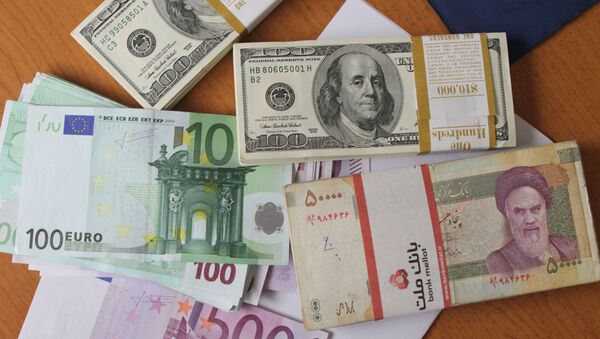Iranian government bodies and companies are being encouraged to use the euro as the main currency in their reports, statistics, publications and financial data.
“The dollar in Iran has no place in our transactions today, with traders preferring alternative currencies for their transactions. There’s no longer any need to continue using dollar-based invoices,” said Mehdi Kasraeipour, the Central Bank’s Director of Foreign Exchange Rules and Policies Affairs.
Tehran has responded to the US’ and its allies’ decision to extend anti-Iranian sanctions in March, which the Islamic Republic describes as “US-led economic collusion.”
“This is a politically motivated decision. Transactions in dollars go through American banks, which pose certain risks to Iran. There are no such risks in transactions in euros,“ said Alexander Razuvaev, director of the analytical department at Alpari.
Experts believe that the US should sound the alarm as Iran has shifted to the euro in its oil dealings; many oil exporters and importers are dissatisfied with the heavy dependence on the American currency. The world is trending to a so-called de-dollarization of the world energy market: such countries as Russia, China, Venezuela, and now Iran, are already on the list.
Since 2016, the St. Petersburg International Mercantile Exchange has been trading for Russian crude in rubles, Venezuela stopped accepting dollars for oil transactions last year, demanding the euro instead, while the Shanghai Exchange launched China’s first yuan-based crude oil futures last month.
READ MORE: Sudan Invites Russia to Take Part in Country's Oil, Gas Projects — Ministry
Alexey Kalachev, analyst at the company Finama investment, stated that there were no restrictions in bilateral trade transactions in national currencies, which would become a means for Russia, Iran and Venezuela to bypass the risks of dollar transactions being blocked.
“A national currency must be easily convertible and be on the list of reserve currencies in order to become an alternative to dollar in energy transactions globally. China, which has launched yuan-based oil futures contracts, is the closest to the goal,” Kalachev said.
Last week, Iran’s Supreme Leader Ayatollah Ali Khamenei held “foreign intelligence” accountable for the “recent issues on the currency market,” asking the country’s secret services to “defuse the plots against the Islamic Republic.”
READ MORE: Iran Warns Trump: If Nuclear Deal Betrayed, There'll Be Severe Consequences
The Iranian rial has weakened as US President Donald Trump’s administration approaches a May 12 deadline to stay in or unilaterally pull out of the 2015 nuclear deal that eased the lion’s share of sanctions on Tehran. Despite the implementation of the accord, the risk of further restrictions and penalties has forced multiple companies to avoid or strictly limit their trade and investment in Iran.
The views expressed in this article are solely those of the speakers and do not necessarily reflect the official position of Sputnik.


